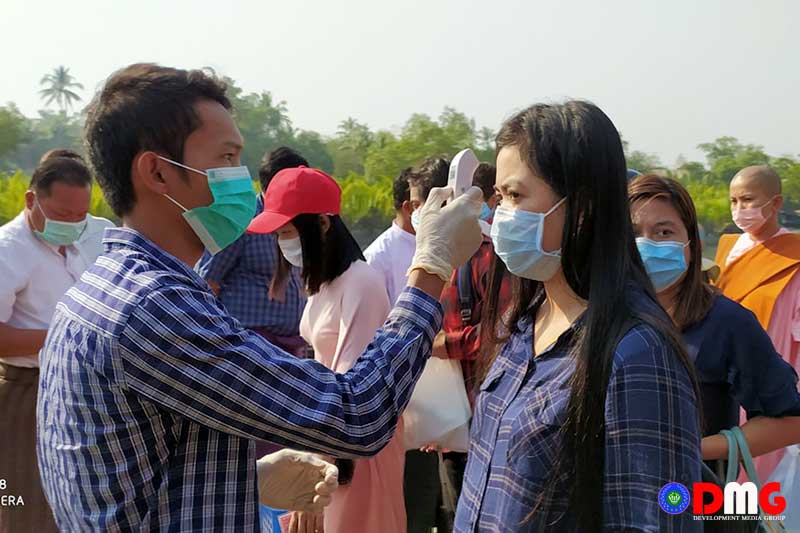- A Glimpse Into the 2026 Arakan State Parliament
- Junta airstrikes target military outposts seized by Arakan Army in Arakan State
- Motorbike spare part prices skyrocket in Arakan State amid tighter traffic rules
- Kyauktaw IDP camps struggle with inadequate latrines
- Religious freedom, interfaith harmony expand in areas controlled by AA in Arakan State
To Defeat Poverty and COVID-19, ASEAN’s Tax Policies Must Change
Before COVID-19, 73.57 million (11%) out of 653.9 million people in ASEAN were living in abject poverty in 2018. Millions more are at the cusp of falling into poverty with economies struggling to resume and full recovery a long way away.
27 Jun 2020

By Lan Mercado, Regional Director, Oxfam in Asia
Before COVID-19, 73.57 million (11%) out of 653.9 million people in ASEAN were living in abject poverty in 2018. Millions more are at the cusp of falling into poverty with economies struggling to resume and full recovery a long way away.
The pandemic has exposed grossly under-resourced public health and social protection systems, with more people needing healthcare to save lives and social protection to get them through the day with their work and incomes at a halt. Getting by has been tougher than ever for daily wage workers, small-holder farmers, women workers in precarious jobs, and many others.
The nations in the region need more resources than ever to ramp up and maintain public goods like universal healthcare and social protection. Even before the pandemic, however, many countries in the region had been struggling to raise sufficient financial revenues for essential public services that have proven to promote the well-being of millions.
That seven of the ASEAN member states have suffered persistent budget deficits for long periods highlights the region’s fiscal woes. Malaysia, Myanmar, and Laos have been in red throughout the past two decades while Vietnam, Cambodia, Indonesia, and the Philippines have only managed to avoid a deficit for at the most four years between 2000-2020.
In 2018, six out of the 10 ASEAN countries had budget deficits, with some also burdened by high levels of public debt. On average, the ASEAN region saw a budget deficit of 1.5% of Gross Domestic Product (GDP), with many country deficits escalating unsustainably. All ASEAN countries will likely face budget deficits in 2020 with an average of 4.2% of GDP.
Deficits and consequently public debt will increase further due to the additional resources mobilised to overcome the pandemic. Expected spending on COVID-19 responses is enormous: Singapore and Thailand will spend 13% and 9% of GDP respectively as fiscal stimulus while the Philippines, Indonesia, and Vietnam will put in about 3% of GDP. At the same time, sharply falling tax revenues due to crippled economic activity will further erode the bottom lines.
ASEAN nations have been unable to achieve desired domestic revenue mobilisation targets despite sustained economic growth and large foreign direct investment during the past two decades. For instance, overly generous corporate tax incentives offered without cost-benefit analysis have eroded the domestic revenue base. Due to such redundant and harmful tax incentives, essential revenues that can go into improving the lives of millions have been drained away.
These tax practices have helped big corporations and the wealthy to prosper at the expense of people. The results can be seen by the high-levels of inequality within and in-between nations of the region. Despite ASEAN’s commitments to progress socially, culturally, and economically in the spirit of equality and partnership, the countries have often been embroiled in mutually harmful competition.
ASEAN needs to politically come together to stop this race to the bottom to promote the collective well-being of the community. That is essential to ensuring sustainable progress and overcoming interrelated challenges like climate crisis, widening inequality, and recovering from the COVID-19 crisis. In our report “Towards Sustainable Tax Policies in the ASEAN Region”, Oxfam and partners present three recommendations that will help the region increase national revenues.
First, ASEAN needs a whitelist and blacklist of tax incentives clarifying incentives that benefit equitable economic growth and that hinder such.
All harmful tax incentives must be blacklisted, and a plan with a deadline must be put in place to phase them out. The list of harmful taxes may include profit-based tax incentives, that offer a low tax rate for profits made like tax holidays, large tax exemptions, loss carry-backs, and preferential rates.
In parallel, the ASEAN should agree on a whitelist of tax incentives to be allowed. The whitelist should include investment-based tax incentives focusing on the contributions to the community. Incentives should be monitored for their effectiveness, and abuses like super deductions or super tax credits should be prevented.
A mechanism needs to be in place at the ASEAN level to monitor tax policy developments and to maintain the lists. It should be transparent, accountable, and have both political representatives and technical experts from administrations, civil society, and academia.
Secondly, ASEAN needs to agree on a common minimum tax standard to stop the race to the bottom. As international policy developments towards a worldwide minimum tax rate continue, the region should agree on a specific approach.
ASEAN countries must agree that corporate tax incentives offered should not go below a minimum effective Corporate Income Tax rate. The to-be-agreed rate could range from 12.5% to 20%. This will protect countries' domestic tax revenues and stop the beggar-thy-neighbour policy orientation.
Finally, ASEAN needs to agree on rules for the good governance of tax incentives. A tax good governance rulebook is needed, and all tax incentives should have a legal basis defined in the corporate tax code with clear criteria. No exemptions must be given arbitrarily to companies.
Any tax incentive should have a clear time frame and end date by law. A cost-benefit analysis on potential tax incentive provisions should be carried out as a prerequisite to the approval of incentives.
All countries in the ASEAN region should publish an annual tax expenditure report transparently along with the annual budget documents. For transparency and good governance, once tax incentives have been granted, tax authorities must monitor the impact and carry out the corresponding cost-benefit assessments.
These recommendations will help ASEAN to — as a cohesive and responsive community — raise revenue for public goods to make a difference in the lives of millions struggling to overcome the pandemic and poverty. Moving beyond, they will allow the region to achieve sustainable and humane progress, both economically and socially.
Notes to the editor:
The report “Towards Sustainable Tax Policies in the ASEAN Region: The Case of Corporate Income Tax Incentives” launched ahead of the 26th ASEAN semi-annual summit can be downloaded at: https://asia.oxfam.org/latest/policy-paper/towards-sustainable-tax-policies-asean







.jpg)













